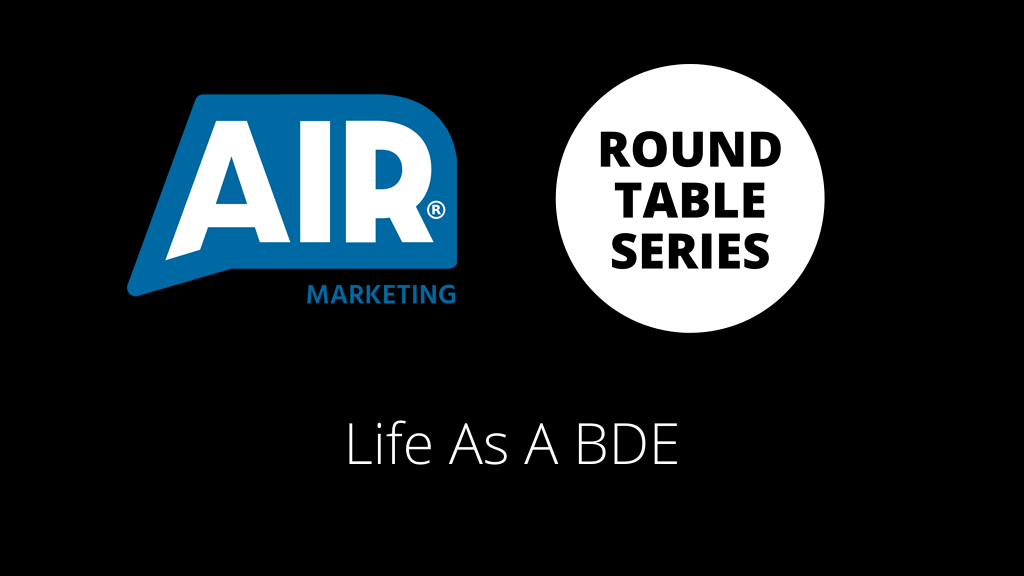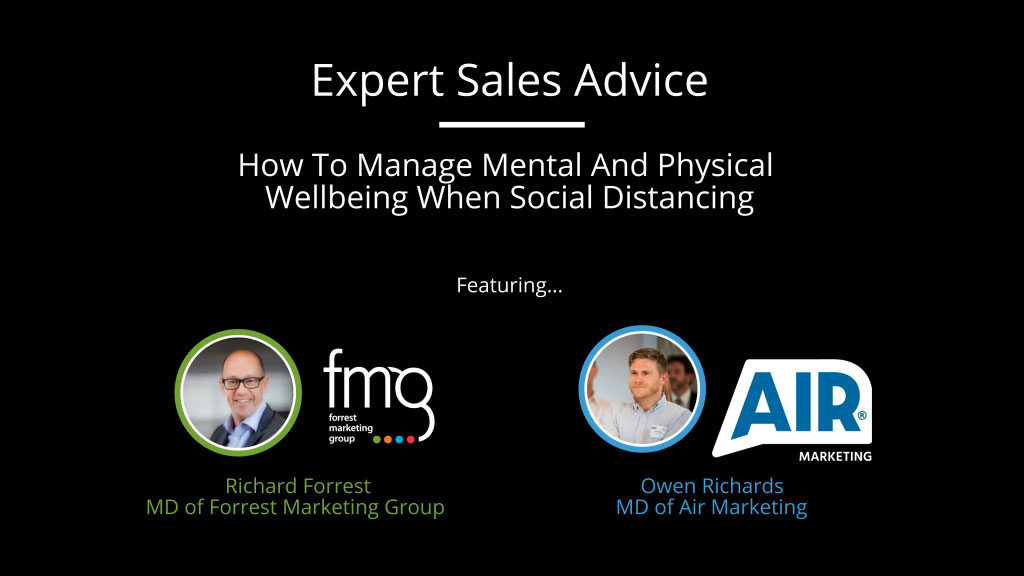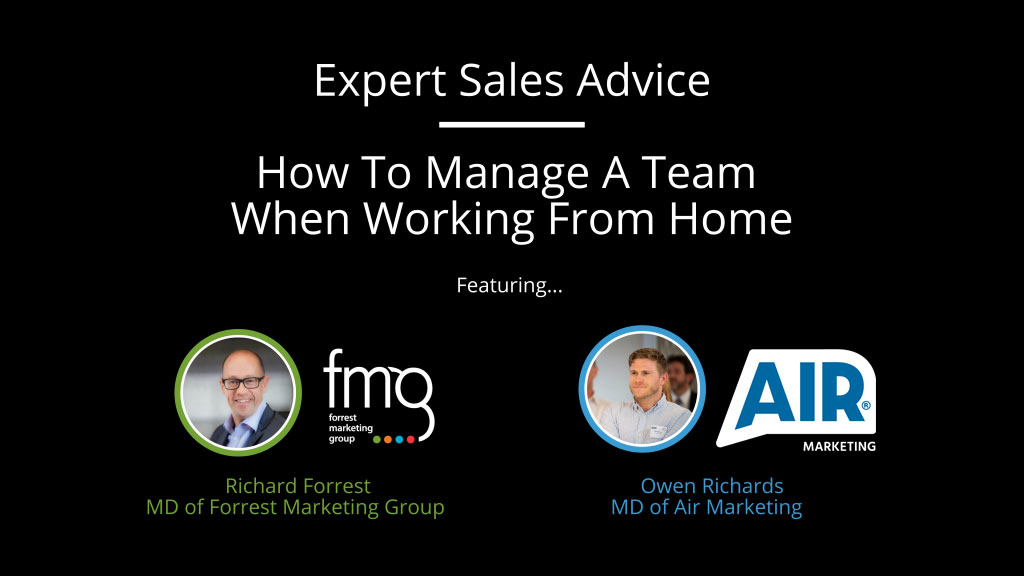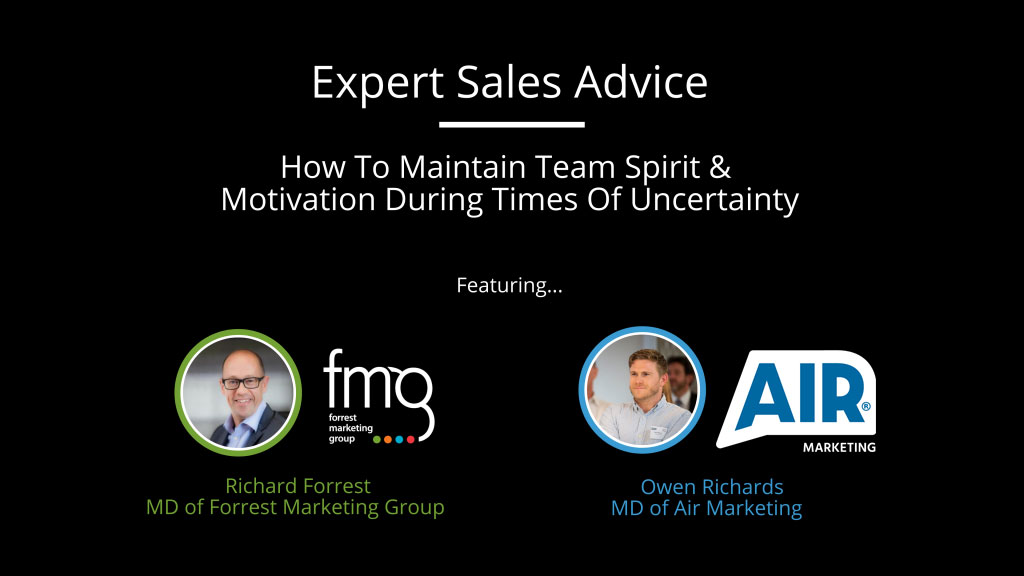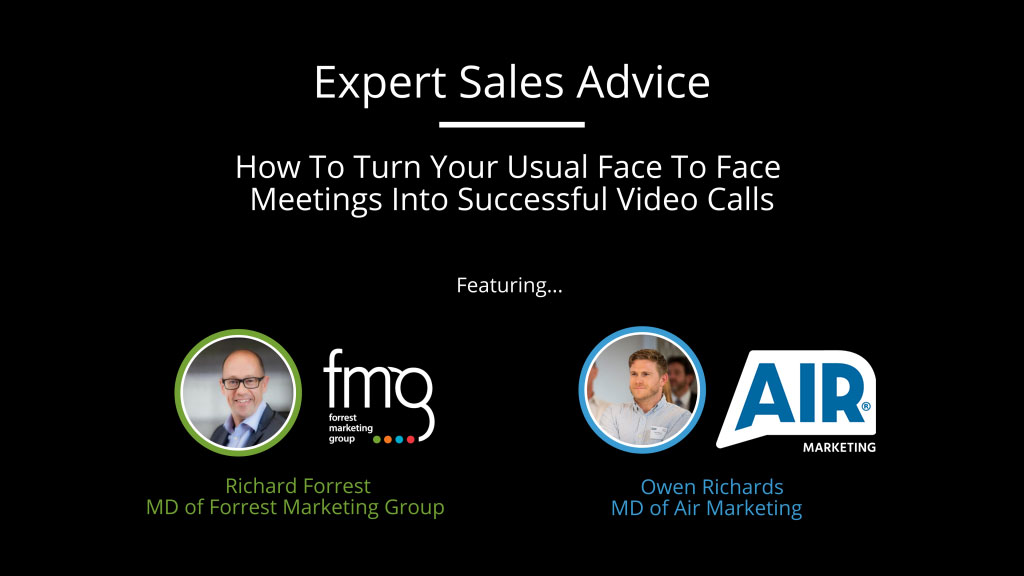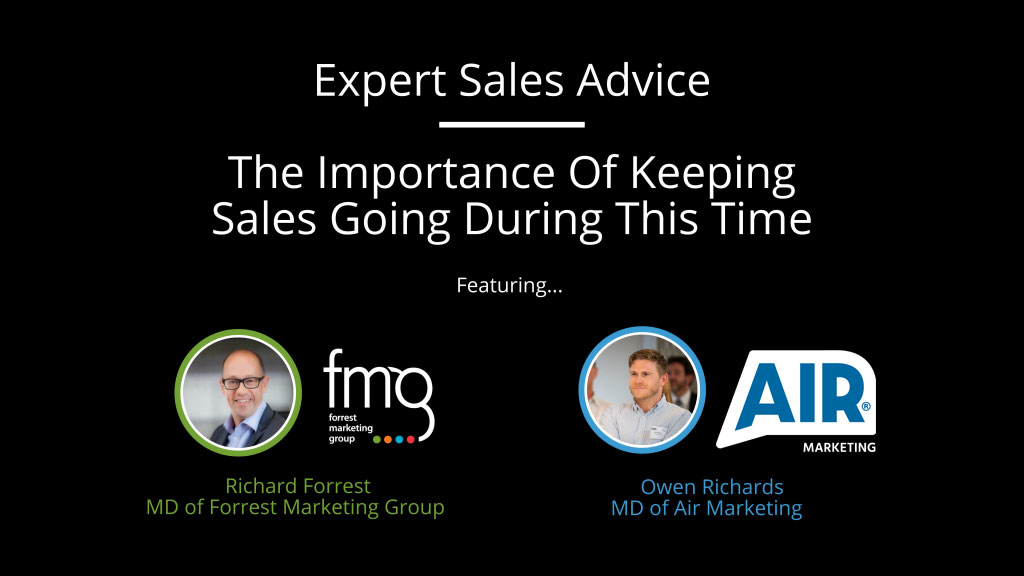This article by Cognism features Air Marketing’s Founder & CEO, Owen Richards.
It will tell you:
- How to identify a sales team that isn’t performing well.
- How to discover the root cause of the problem affecting an underperforming team.
- How to solve issues related to activity, data, messaging and climate.
- How to manage underperforming team members and communicate effectively with your staff.
Scroll down to read the Q&A.
What warning signs tell you when a sales team is underperforming?
Owen’s answer here was – it depends on the team.
“If you’re managing an SDR team, look at meetings booked. If you’re managing AEs, then look at pipeline and revenue contribution. For outbound sales, the key drivers are: is revenue coming in and is it staying stable?”
Owen identified a problem with revenue as a metric.
“The problem with revenue is it’s a lagging metric – it’s showing you what happened 2 or 3 months ago. By the time you spot a problem, it’s too late. The sales cycle for most SaaS businesses is between 3-9 months. If you look at revenue today and you see that it’s down, then that’s from 3 months or more ago.”
For Owen, productivity metrics are the ones to focus on.
“Look at things like activity metrics. The number of calls and the number of conversations – remember these aren’t always the same. Look at connect rates – are people calling the right numbers? Post-pandemic, you get better results from calling mobile numbers than switchboards or landlines.”
“Then look at conversion rate – the number of people that your reps speak to and actually book a meeting. Meeting quality is also important – how many of those meetings become opportunities and enter the pipeline?”
Owen stressed the importance of going beyond metrics and considering the mood of the team.
“Look at climate – how does it feel to be in the room? Are people happy or stressed? It’s a tough one to measure but it’s critical.”
“You can get a feel for climate from things like conversation quality, if you have conversation analytics. You can get it from 121s, from your line managers reporting back. It’s a lot less tangible but very valuable, in my experience.”
“In larger teams, employee retention data is a good way of spotting trends. If staff turnover is high, then there’s likely a climate issue.”
Owen gave us his checklist for spotting an underperforming sales team:
- If it’s a reduction in calls – it’s a climate or activity-related problem. Or something’s getting in the way of performance – your reps are being distracted.
- If it’s a reduced contact rate/calls aren’t connecting – it’s a data problem – your SDRs aren’t calling the right numbers.
- If it’s a reduced conversation-meeting rate – either your messaging is off or your team needs more training (they aren’t saying the right things on their calls).
- If it’s a reduced meeting-opps rate – there’s an issue with AE performance.
“Those are the metrics I’m looking at consistently – and usually one of them can tell me where the problem lies.”
Do you need tech to spot an underperforming sales team?
Owen was very clear on this point.
“Can you do it manually? Yes.”
“Can you do it as effectively? No.”
He explained his thinking…
“Manual is very retrospective – it’s all about looking backwards.”
“But with tech, you can spot the problem almost straight away. It also tends to be more accurate. I’ll say that’s not always the case – tech is only as good as the data going into it and humans are capable of messing up data input.”
“But in general, it’s a no-brainer. If you want to be best in class, you need a sensible tech stack. It doesn’t have to be too complicated – the essentials are a good CRM, a good phone system and good B2B data. Conversation analytics and pipeline tracking are also very useful.”
Owen walked us through how reporting worked at Air Marketing.
“I receive daily reports from my SDR Managers. These include activity metrics and conversation metrics. When you report on a daily basis, it means you can jump on problems a lot quicker. It’s been very successful for us.”
Once you’ve identified problems in your sales team, what steps should you take?
Owen’s first step is to diagnose the problem. The second step is to find out why it’s happening.
“To do this, you work backwards through the funnel to find out why. You have to get to the root cause of the issue.”
“If it’s an activity problem, then you have to ask: are we not talking to enough people? Or are we talking to enough people but we’re not getting enough of them to say yes?”
“Then you work backwards. If we’re talking to enough people, but a lot of them aren’t saying yes – then I know it’s a conversation quality issue. If we’re not talking to enough people in the first place, then chances are it’s either the data is wrong or the team’s work ethic is lagging.”
“Or it could be that the team is getting distracted. Are people having too many internal meetings, for example – leaving them with not enough time to call? Then you need to get even more granular – does the problem affect the whole team or just certain individuals?”
The third step in Owen’s process is to solve the issue.
“Think about what you can put in place that will solve the problem. Is it better data or more training around messaging? It isn’t always telling people to work harder – there’s no point getting SDRs to make more calls if they don’t have the right messaging or the right numbers.”
“So here I’d schedule some refresher training sessions around messaging, cold calling and conversations.”
“Or I could be looking at removing things that are standing in their way – helping them to reduce their admin, for example.”
What’s best practice for solving activity issues?
In Owen’s experience, activity reduction is usually driven by just one thing – climate.
“A number of factors affect climate in your sales team, namely: are your SDRs feeling ok at work? Has their manager left? Maybe some people have come into the team and disrupted it. Maybe there’s been a lot of sickness in the team recently. It could be down to lots of things like that.”
“As a B2B sales leader – you need to understand what’s causing it.”
Owen told us about his solutions for improving climate.
“If your SDRs aren’t feeling as motivated as they should be, schedule some 121s with them and understand what’s causing it.”
In situations like this, Owen is a strong advocate of data-led management.
“You have to provide some proof backing up what you say. Let’s say their activity has dropped by 20% compared to last month – present them with a graph showing this and ask them what’s causing it.”
“Usually, you’ll get a straight answer. If they’ve been distracted, then it’s usually something like they’ve been asked by marketing to contribute to a project or they spent 2 days at an expo. Sometimes they might not even realise there’s a problem.
“Then you ask them a simple question: what can they do to improve this month? Get the SDR to suggest their own solutions. People are more likely to adopt change if it’s their own idea, rather than you telling them what to do.”
The next step is to maintain consistency and accountability.
“Once the SDR has provided the solution, agree to hold them to it. Schedule weekly catch-ups for the next 4 weeks and find out how they’re getting on.”
Owen’s preference for data-led management doesn’t stop at the first 121.
“Transparency is very important. Give the SDR access to their activity data; let them see it and track it themselves. If their activity improves over the next month, then that’s a job well done.”
What about improving climate for a team, not an individual?
“You follow the same principle. Take 2 or 3 people in the team and present them with the data. Ask them, why has 80% of the team seen a 20% reduction in calls?”
“Then involve them in the discussion. Let them recommend solutions. People are always more accountable if they’re working with their own solutions.”
Owen had some great advice for SaaS sales leaders:
“As a leader, you’re not there to tell your team what to do. You’re there to facilitate them and help them to be the best they can be.”
What’s best practice for solving data issues?
Owen had lots to say about how sales teams should best use data.
“If we’re dialling lots of people but meetings aren’t being booked, then I know that’s a data issue.”
“The thing is, data can be good for a period of time. But it doesn’t always last. If things start to go wrong, look at your tech stack.”
“Have you pulled data from a different data provider than usual? Also, consider your targeting – have you gone into a new market or segment where the data isn’t as good?”
“Another problem you often encounter is that sometimes your messaging doesn’t match the data. And if that happens, if the messaging and data don’t match, then your reps will be calling prospects and saying the wrong things.”
“My advice is to structure and segment your data and ensure the messaging is right for each segment.”
Owen keeps a couple of questions in mind when thinking about this:
- Are we calling phone numbers that don’t connect? That’s a sign your data isn’t good to start with.
- Are we calling phone numbers but not booking meetings? That’s a sign you’ve got viable phone numbers but they’re in the wrong orgs.
What’s best practice for solving messaging issues?
Owen said:
“Almost always this is down to reps.”
Why?
“They change what they do without realising it. They listen to podcasts, they listen to each other and they learn new things. They try things out and copy what they hear. Then you get a drift in messaging – they say something new without realising it.”
“Drift happens incrementally, it’s not a radical change. A cold call an SDR made 3 months ago will sound completely different to one they make today. The changes happen subtly over long periods of time.”
Owen shared his process for dealing with message drift.
“This is where call recording software comes in. As I said earlier, you need tech to do this. It gives you the ability to listen back to calls. It’s vital for an outbound sales team.”
What would Owen do if he noticed a rep was having this problem?
“I’d sit down with them and play them their successful calls from 3 months ago and the calls they’re making now. Then I’d ask them: what’s different? What’s changed in your conversation? Are any of those changes conscious and if so, why?”
“Again you need to present them with the evidence that things have changed. The key is listening to call recordings and comparing them.”
The things that Owen looks out for in recorded calls are:
- Has the SDR changed the messaging?
- Is the SDR not handling objections in the same way?
- Are the conversations too short? Is the SDR rushing it?
- Is it their tone of voice? Are they coming across as too pushy or too laid-back?
“The way of solving all of these issues is through more training.”
What’s best practice for solving climate issues?
We’ve all heard about company culture – but what’s company climate?
Owen said:
“Culture is the things you do – socials, perks, training, incentives. A good culture is one that constantly invests in its people and makes the workplace the best it can be.”
“Climate is how it feels to work here. How does it feel to work in that team or walk into that room? Are people engaged and happy? Are they feeling positive? Do they like coming in every day?”
Owen highlighted why it’s important to be aware of the difference.
“You can have a good company culture but a bad company climate. For me, climate creates the biggest impact on how people work.”
“Climate isn’t always consistent; it can change from day to day. But generally, you want your team to be feeling positive most of the time.”
What sort of things affect climate in a sales team?
“All sorts! Someone in senior leadership leaves, for instance. Or if a couple of redundancies are made and then everyone else gets worried.”
In Owen’s opinion, why is it important to measure climate?
“It drives all the other things I’ve talked about. If people are feeling unhappy, they won’t work hard. They won’t put the effort in or be as motivated, so then your activity levels will fall.”
“Climate can cause drift in conversations because if your SDRs are thinking about what’s happening in the business, then they won’t be as focused on their calls.”
“This is a really important part of running a sales team. Reps need constant motivation – it’s a challenging and repetitive job. They’re affected by external factors all day, every day. Often they’re in the early stages of their career; they’re not as experienced or commercially mature as managers.”
What are Owen’s tips for maintaining a healthy climate?
“It all comes down to management. Good sales team managers don’t just manage, they do. They get on the phones, they speak to customers and prospects. They lead from the front. They run team meetings and let their team speak.”
So you need to make sure your SDR team leaders/managers are:
- Demonstrating positive reinforcement.
- Celebrating individuals and their contributions.
- Holding honest 121s.
- Holding good team meetings where everyone has the chance to speak.
When dealing with an underperforming sales team, how important is communication?
Owen answered this question by saying:
“Leadership is all about communication. It’s also one of the things that people find hardest about leadership.”
“As humans, we’re often uncomfortable about having difficult conversations. In a leadership role, you can’t be nice all of the time. You need to have honest, straightforward conversations with people.”
Owen told us about the first thing he teaches new team leaders at Air Marketing.
“Data-led management is one of the most powerful tools in sales leadership. If you’re showing someone that their performance has dropped, and it’s all there in the data, they can’t argue with that. It’s not your gut feeling or guesswork; you’re not singling them out or having a go at them. It’s fact.”
“Presenting them with a problem is just one part of it. You then have to involve them in the solution – what would they do to solve it? Give them the opportunity to come up with a fix.”
And the most important part of communicating with your team? Owen concluded with:
“It isn’t speaking – it’s listening! That’s the key to it.”
“Ask the rep a question, then sit back and let them answer. A really good question to ask is: what would you do if you were managing someone in this position?”
“That gets them thinking like a manager – they get thinking about the solution, rather than the problem.”
“In sales, you can have hundreds of problems every day – but it’s how you deal with them that counts.”


